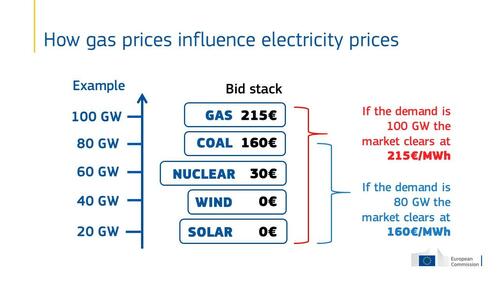EU’s Unelected Bureaucrat Leader Proposes Price Controls As Last Resort To Blunt Energy Price Shock
Now that the US and EU have reached a deal to boost LNG exports to the bloc to start the long and laborious process of weaning Europe off its dependence on Russian oil (a lofty ambition that may as yet never be realized), it seems the EU’s ruling unelected bureaucrats are already drumming up fresh ideas to mitigate the impact of surging energy costs on regular people – in ways that don’t require billions of euros in gas stimmies.
In a series of tweets sent early Friday that focused on mitigating Europe’s surging electricity costs, European Commission President Ursula von der Leyen suggested a two part plan; first, the bloc must bargain with once voice to increase its leverage over prices for pipeline gas and LNG. And if that doesn’t work, von der Leyen suggested that price controls could be in the offing.
Here’s von der Leyen in her own words (source: @vonderleyen):
* * *
The transatlantic partnership stands stronger than ever.
In a world faced with disorder, our unity upholds fundamental values and rules that our citizens believe in.
And we are determined to stand up against Russia’s brutal war.
Our cooperation on the sanctions against Russia has been exceptional. It shows that when we act together, we are stronger and can make a difference. We are now reinforcing our cooperation in:
Humanitarian aid to Ukraine
Energy • Protecting our democracies
Pleased that we found an agreement in principle on a new framework for transatlantic data flows.
It will enable predictable and trustworthy US-EU data flows, balancing security, the right to privacy and data protection.
This is another step in strengthening our partnership.
But to drive prices down and enhance our energy security in the longer-term, we have to look at the root cause of the price spike.
Namely high and volatile gas prices and their impact on electricity prices.
With a true European approach to buying pipeline gas, we have important leverage.
So instead of outbidding each other and driving prices up, we should pull our common weight.
This is why we are proposing common gas procurement and stricter rules for storage.
We pool our demand and reach out to international partners to negotiate LNG and pipeline gas via a new EU Energy Platform.
In parallel we use storage facilities in some Member States to the benefit of all.
If needed, we can consider price caps.
We will move fast.
In May, we will present options to optimise the electricity market design, so it better supports the green transition.
And we will propose to phase out Russian fossil fuels from our energy mix by 2027.
* * *
The hint of price controls harkens back the 1970s, when President Nixon froze prices (and wages) by executive fiat to counter inflation. As the Europeans try to contain the cost of heating homes with an eye toward the 2022-2023 winter, there are other strategies that they could employ. The IEA recently unveiled a 10-point plan that recommended a handful of (similarly dystopian) measures to blunt the impact of higher energy prices, including urban driving bans and reducing speed limits on highways.
Tyler Durden
Fri, 03/25/2022 – 11:03

